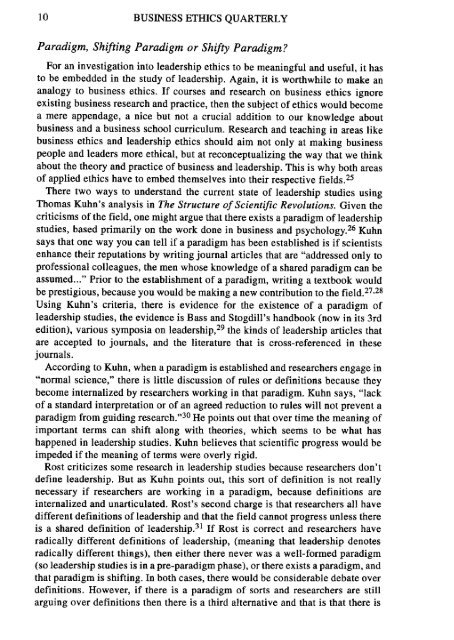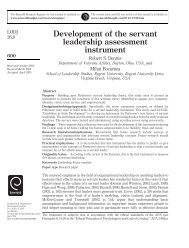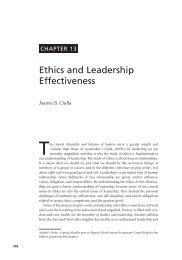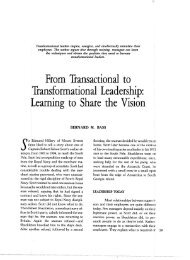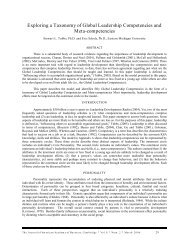LEADERSHIP ETHICS: MAPPING THE TERRITORY - Strand Theory
LEADERSHIP ETHICS: MAPPING THE TERRITORY - Strand Theory
LEADERSHIP ETHICS: MAPPING THE TERRITORY - Strand Theory
You also want an ePaper? Increase the reach of your titles
YUMPU automatically turns print PDFs into web optimized ePapers that Google loves.
10 BUSINESS <strong>ETHICS</strong> QUARTERLY<br />
Paradigm, Shifting Paradigm or Shifty Paradigm?<br />
For an investigation into leadership ethics to be meaningful and useful, it has<br />
to be embedded in the study of leadership. Again, it is worthwhile to make an<br />
analogy to business ethics. If courses and research on business ethics ignore<br />
existing business research and practice, then the subject of ethics would become<br />
a mere appendage, a nice but not a crucial addition to our knowledge about<br />
business and a business school curriculum. Research and teaching in areas like<br />
business ethics and leadership ethics should aim not only at making business<br />
people and leaders more ethical, but at reconceptualizing the way that we think<br />
about the theory and practice of business and leadership. This is why both areas<br />
of applied ethics have to embed themselves into their respective fields.^^<br />
There two ways to understand the current state of leadership studies using<br />
Thomas Kuhn's analysis in The Structure of Scientific Revolutions. Given the<br />
criticisms ofthe field, one might argue that there exists a paradigm of leadership<br />
studies, based primarily on the work done in business and psychology.^^ Kuhn<br />
says that one way you can tell if a paradigm has been established is if scientists<br />
enhance their reputations by writing journal articles that are "addressed only to<br />
professional colleagues, the men whose knowledge of a shared paradigm can be<br />
assumed..." Prior to the establishment of a paradigm, writing a textbook would<br />
be prestigious, because you would be making a new contribution to the field.'^^'^*<br />
Using Kuhn's criteria, there is evidence for the existence of a paradigm of<br />
leadership studies, the evidence is Bass and Stogdill's handbook (now in its 3rd<br />
edition), various symposia on leadership,^^ the kinds of leadership articles that<br />
are accepted to journals, and the literature that is cross-referenced in these<br />
journals.<br />
According to Kuhn, when a paradigm is established and researchers engage in<br />
"normal science," there is little discussion of rules or definitions because they<br />
become internalized by researchers working in that paradigm. Kuhn says, "lack<br />
of a standard interpretation or of an agreed reduction to rules will not prevent a<br />
paradigm from guiding research.''^^ He points out that over time the meaning of<br />
important terms can shift along with theories, which seems to be what has<br />
happened in leadership studies. Kuhn believes that scientific progress would be<br />
impeded if the meaning of terms were overly rigid.<br />
Rost criticizes some research in leadership studies because researchers don't<br />
define leadership. But as Kuhn points out, this sort of definition is not really<br />
necessary if researchers are working in a paradigm, because definitions are<br />
internalized and unarticulated. Rost's second charge is that researchers all have<br />
different definitions of leadership and that the field cannot progress unless there<br />
is a shared definition of leadership.^^ If Rost is correct and researchers have<br />
radically different definitions of leadership, (meaning that leadership denotes<br />
radically different things), then either there never was a well-formed paradigm<br />
(so leadership studies is in a pre-paradigm phase), or there exists a paradigm, and<br />
that paradigm is shifting. In both cases, there would be considerable debate over<br />
definitions. However, if there is a paradigm of sorts and researchers are still<br />
arguing over definitions then there is a third alternative and that is that there is


